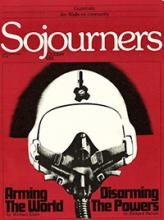Clad in a necktie for the first time in about two years, I entered the jury lounge along with 200 other people. Our first day of jury duty was about to begin. I was glad to see that the room was comfortable and spacious, for I guessed that I would have plenty of time on my hands for the next two weeks. I brought a briefcase full of books, letters, unmended clothes, needles and thread, and my lunch.
I was to be paid $30 a day for serving. That seemed like a small fortune compared with $13.23 per day, my salary at Sojourners.
As the jury officer called the roll, I discovered that my identity would change from Dan Goering to Number 206 while I was here. I also discovered, by watching the movie shown to prospective jurors, that in order to be a good juror one has to be "impartial and fair" and decide cases solely on the basis of the evidence. I felt like a fish out of water and wondered whether I could possibly be "impartial" or "fair" as defined by the U.S. judicial system. I have such a low opinion of this country's prisons that I wanted to avoid, if possible, doing anything to put someone there. There was, I figured, no way I would be chosen to serve on a jury.
Then the waiting started. As I was mending the first of six shirts I had lined up for the week, I heard a series of numbers coming from the loudspeaker, "...two-oh-six." I was chosen for the first jury panel of the day.
Fifty of us marched down the hall and filed into the courtroom. In front of the bench several people were seated. Two men in stylish three-piece suits were seated at tables facing the bench. I guessed that these were the attorneys. Another well-dressed man began calling the roll of jurors: the warden, no doubt. An impeccably clad woman was recording every word. The clerk, I surmised.
Read the Full Article

